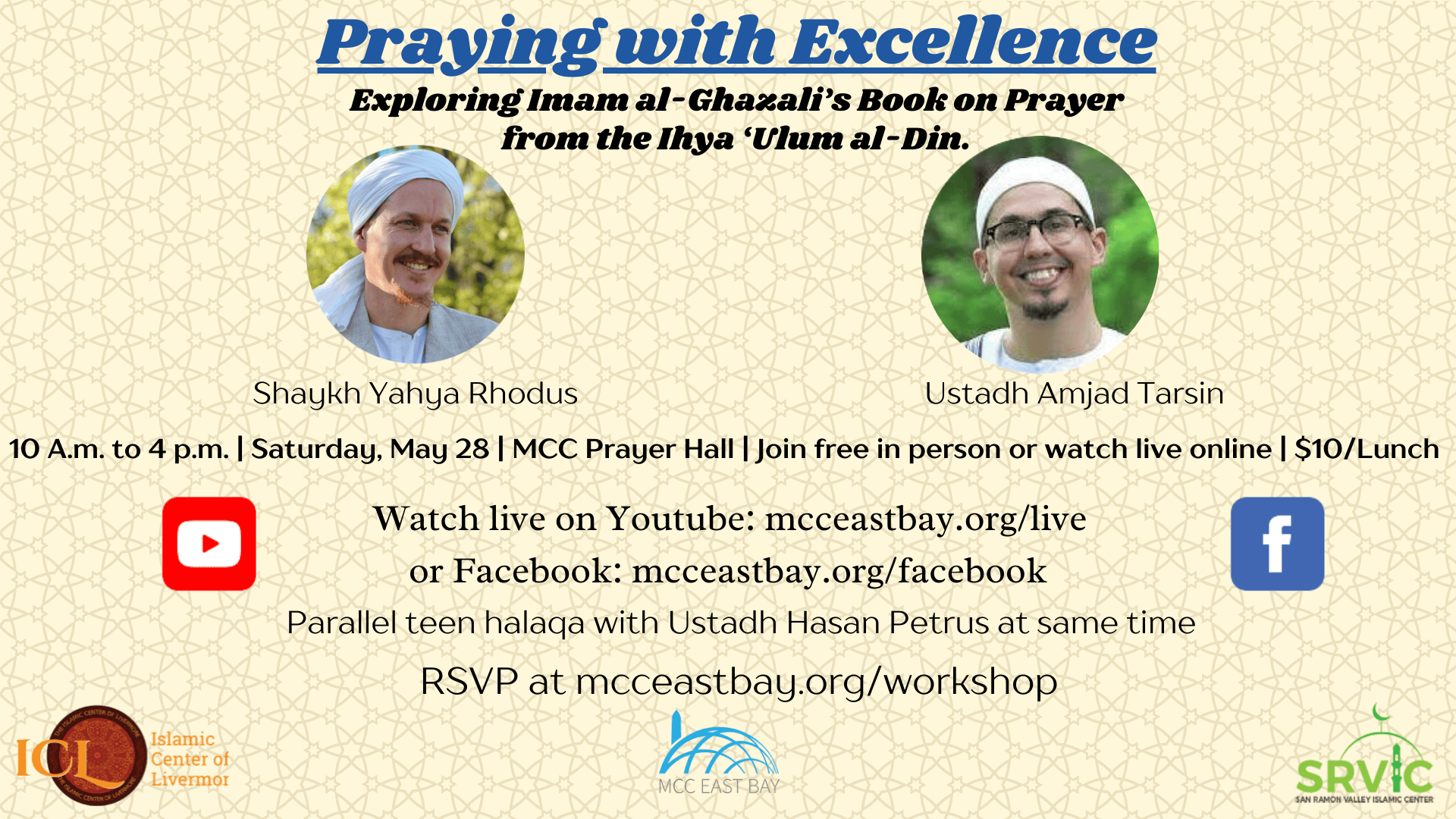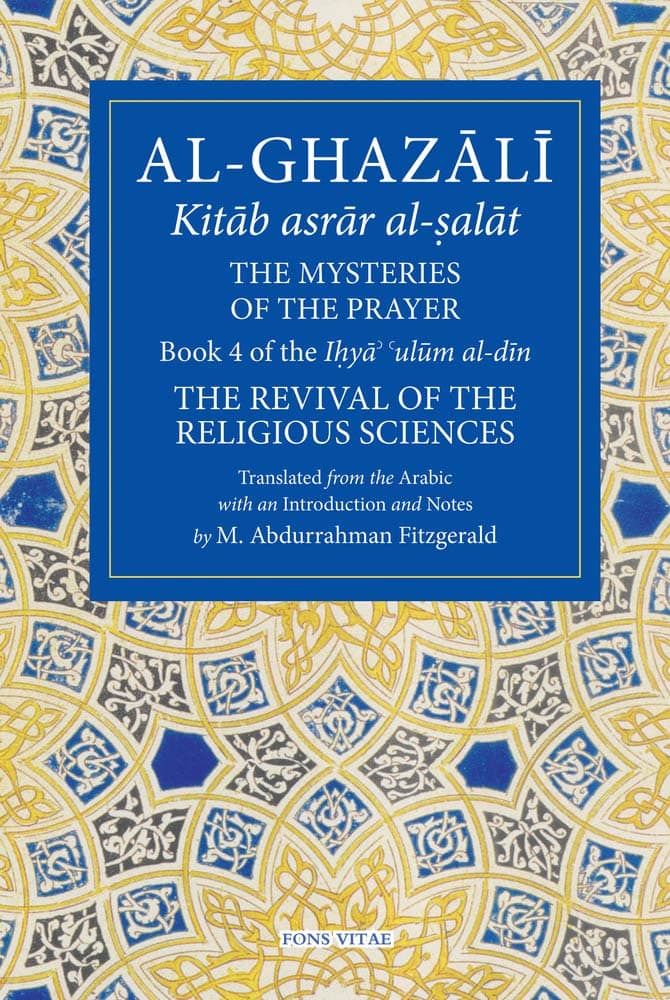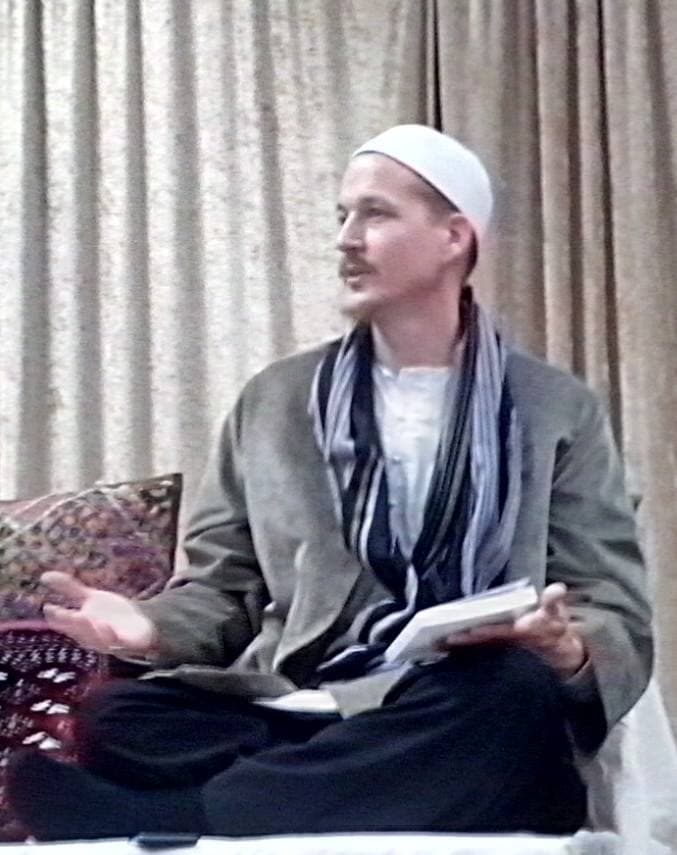Join Shaykh Yahya Rhodus & Ustadh Amjad Tarsin for a Saturday workshop exploring Imam al-Ghazali’s “The Mysteries of the Prayer and Its Important Elements” from Ihya’ ‘ulum al-din (The Revival of the Religious Sciences).
10 a.m. to 4 p.m. | Saturday, May 28 | MCC Prayer Hall (in person) | Join free in-person or watch live online at https://mcceastbay.org/live | $10/ Lunch (optional) | Register for lunch only (no RSVP needed to attend workshop) at https://mcceastbay.org/workshop
Sponsored by San Ramon Valley Islamic Center (SRVIC), Islamic Center of Livermore, and MCC East Bay.
- – More Shaykh Yahya: https://mcceastbay.org/yahya
- – More Ustadh Amjad: https://mcceastbay.org/amjad
- – Handout: “Excellence in Prayer: An Abridged Seminar on Book 4 of the Iḥyā’ ‘Ulūm al-Dīn”: https://mcceastbay.org/excellence-prayer
This talk will be streamed live at:
- – MCC YouTube: https://mcceastbay.org/live
- – MCC Facebook: https://mcceastbay.org/facebook
- – MCC Instagram: https://mcceastbay.org/instagram
- – SRVIC YouTube: https://www.youtube.com/channel/UCzISZh59R_nvs5nzFrJPR1g/videos
- – SRVIC Facebook: https://www.facebook.com/SRVICSR
Shaykh Yahya Rhodus will also deliver the first Khutbah (1:30 p.m. to 1:50 p.m.) at MCC on Friday, May 27.
In addition to this Salah workshop, Shaykh Yahya’s colleague Ustadh Hasan Petrus will also have a parallel teen workshop: https://mcceastbay.org/event/teens-ustadh-hasan-petrus
MCC has a standing policy that financial need should never hold a person back from acquiring religious knowledge offered within the MCC community center. For a financial waiver, please message scholarship@mcceastbay.org
Schedule:
- – 9:30 a.m. – In-person check-in begins (online viewers will receive the Livestream link at 9:30 a.m. PST in their inbox)
- – 10 a.m. – Adult workshop begins in Prayer Hall and teen workshop begins in Conference Room
- – 1 p.m. – Teen workshop ends
- – 1:15 p.m. – Adult workshop breaks
- – 1:30 p.m. – Adults and Teens join Zuhr prayer
- – 1:45 p.m. – Lunch for adult and teen attendees in Banquet Hall (Beef & chicken sandwiches from Mirchi Cafe Dublin)
- – 3 p.m. – Shaykh Yahya continues the workshop (registered teens may join this session)
About Shaykh Yahya:
One of the most well-respected Muslim scholars in the Western world, Shaykh Yahya Rhodus has spent the best part of two decades studying at some of the most prestigious learning institutions in the Muslim and Western world.
Having embraced Islam at the age of 19 in Santa Clara, California, he immediately began his study of the Islamic sciences with Shaykh Hamza Yusuf and visited Mauritanian scholars, such as Shaykh Khatri Wuld Bayba, and Shaykh Abd Allah Wuld Ahmadna. Shortly thereafter, he traveled to Mauritania to pursue a full-time course of study where he was able to learn from one of Mauritania’s greatest scholars, Murabit al-Hajj. Following an interim period of study in Damascus, Syria, Shaykh Yahya went on to spend the best part of seven years in Tarim, in the Hadramawt Valley of Yemen. There, he studied at the reputable school, Dar al-Mustafa, with the renowned scholars Habib Umar bin Hafiz and Habib Ali al-Jifri.
Since that time, Shaykh Yahya has been the official translator for Habib Umar and Habib Ali at various international speaking engagements, including the Common Word Conference held at Yale University in 2008. Upon returning to the United States, Shaykh Yahya served as a full-time instructor at Zaytuna College. He holds a B.A. in Near Eastern Studies from UC Berkeley, an M.A. in Islamic Studies from the Graduate Theological Union, and is currently pursuing a PhD in Theology and Religious Studies at the University of Cambridge, England, in collaboration with Dr. Tim Winter (Shaykh Abdal Hakim Murad).
He is the Founding Director of al-Maqasid where he is a full-time scholar and teacher. Al-Maqasid’s mission is to cultivate holistic learning environments rooted in knowledge, devotion, and service by providing full-time, part-time, online, and community programs.
About Ustadh Amjad:
Ustadh Amjad Tarsin was born in Ann Arbor, Michigan and spent his early childhood there. He has also lived in Malaysia and Saudi Arabia, growing up within diverse cultures. He obtained his Bachelor of Arts at the University of Michigan in English Literature and Islamic Studies. It was during his university years that Amjad developed a deeper connection to his faith, studying the Islamic sciences with teachers locally and internationally, and became actively involved in community service and youth engagement. After spending a transformative year studying Islam abroad at Dar al-Mustafa, Yemen, Ustadh Amjad returned to America to start his studies at the University of Michigan Law School. Yearning to fulfill his calling to community building, spiritual development, and service, Ustadh Amjad changed career paths and enrolled in Hartford Seminary’s Islamic Chaplaincy program. While completing his degree, Ustadh Amjad worked as a part-time Muslim chaplain at Fairfield University, Connecticut. In 2012, Sidi Amjad was selected as the University of Toronto’s first full-time Muslim Chaplain. Ustadh Amjad continues to study and teach on a regular basis at SeekersHub Toronto. He currently resides with his wife and son in Toronto, Canada.
Ustadh Hasan Petrus was born and raised north of the border in Montreal, Canada. His pursuit of sacred Islamic knowledge has taken him to two continents to sit at the feet of those who still carry unbroken chains of sacred learning. During his stay in South Africa, Ustadh Hasan focused primarily on Quranic Studies. He subsequently moved to Tarim, Yemen, to study at Dar al-Mustafa. During his time there, he was able to study various Islamic sciences, benefiting directly from Habib Umar bin Hafiz, Habib Muhammad bin Abdullah al-Aydarus, Habib Hashim bin Aqil, Shaykh Umar bin Husayn al-Khatib, and others.
He returned from Tarim in 2015 to become a faculty member at Al-Maqasid, where he leads the Classical Arabic Program.
Questions? events@mcceastbay.org
About the Book Used in the Seminar (optional purchase):
The Mysteries of the Prayer and Its Important Elements
Book 4 of Ihya’ ‘ulum al-din, The Revival of the Religious Sciences
by Imam al-Ghazali (Author), Michael Abdurrahman Fitzgerald (Translator)
In The Mysteries of the Prayer and Its Important Elements, book four of the 40 books of the Revival of the Religious Sciences, Abū Hāmid al-Ghazālī explains the inner and outer meanings of the prayer, a central practice for Muslims. He explains the acts involved in the outward elements of the prayer and outlines which of these acts are obligatory and which are sunna. He then discusses the inward requisites of the prayer—the practices of the heart— and presents practical remedies for a distracted heart. He also discusses the annual prayers and the prayers and supplications related to events such as eclipses, the prayer for rain, guidance, and need. This readable yet comprehensive work covers an array of issues from the essential outward aspects of how to pray, to the inward aspects of the state of the heart during the prayer and how to humble oneself completely. As a practical, yet profound book, it is essential reading for Muslims who seek a deeper comprehension of prayer, and for all those interested in understanding the meaning and place of prayer in Islam.
Imam al-Ghazali (1058–1111 CE) of Tus in Iran was one of the greatest scholars in the history of Islamic thought. He made outstanding contributions in logic, philosophy, jurisprudence, legal theory, and mysticism.
Excellence in Prayer
An Abridged Seminar on Book 4 of the Iḥyā’ ‘Ulūm al-Dīn
Session 1: The Merit of Prayer
- • The merit of the adhan
- • The merit of the obligatory prayers
- • The merit of the congregational prayer
- • The merit of prayer in the mosque
- • The merit of prostration
Session 2: The Inner States of Prayer
• Presence of heart (ḥuḍūr al-qalb)
• Understanding (tafahhum)
• Exaltation (ta‘ẓīm)
• Awe (hayba)
• Hope (rajā’)
• Shame (ḥayā’)Session 3: Reverence (Khushū‘) and Presence of Heart (Ḥuḍūr al-Qalb)
• The merit of reverence (khushū‘)
• Outward distractions and their treatment
• Inward distractions and their treatment
• Cutting down the tree of desiresSession 4: The Inner Meanings of Prayer
• Adhan
• Purification
• Cleaning impurities from the body, clothes, and place of prayer
• Covering the body
• Facing the qibla
• Iqāma
• Standing
• Intention - • Takbīra al-iḥrām (saying “Allāhu Abkar”)
- • Opening supplication (du‘ā’ al-istiftāḥ)
- • Ta‘awwudh (saying “I take refuge in Allah from the accursed Devil”)
- • Recitation of the Fātiḥa
- • Recitation of Quran
- • Rukū‘ (bowing)
- • Straightening up (‘itidāl)
- • 1st sujūd (prostration)
- • Sitting between the two prostrations
- • 2nd sujūd (prostration)
- • Tashahhud (testification of faith)
- Sending ه’لprayers upon the Prophet (PBUH)
- • Supplication
- • Taslīm (saying “as-salāmu ‘alaykum”)
- • After the Prayer





